William “Billy” Lawson
Born in Luton in 1867. This entry from the Luton News handbook of 1901 gives us an insight into Billy’s early life.
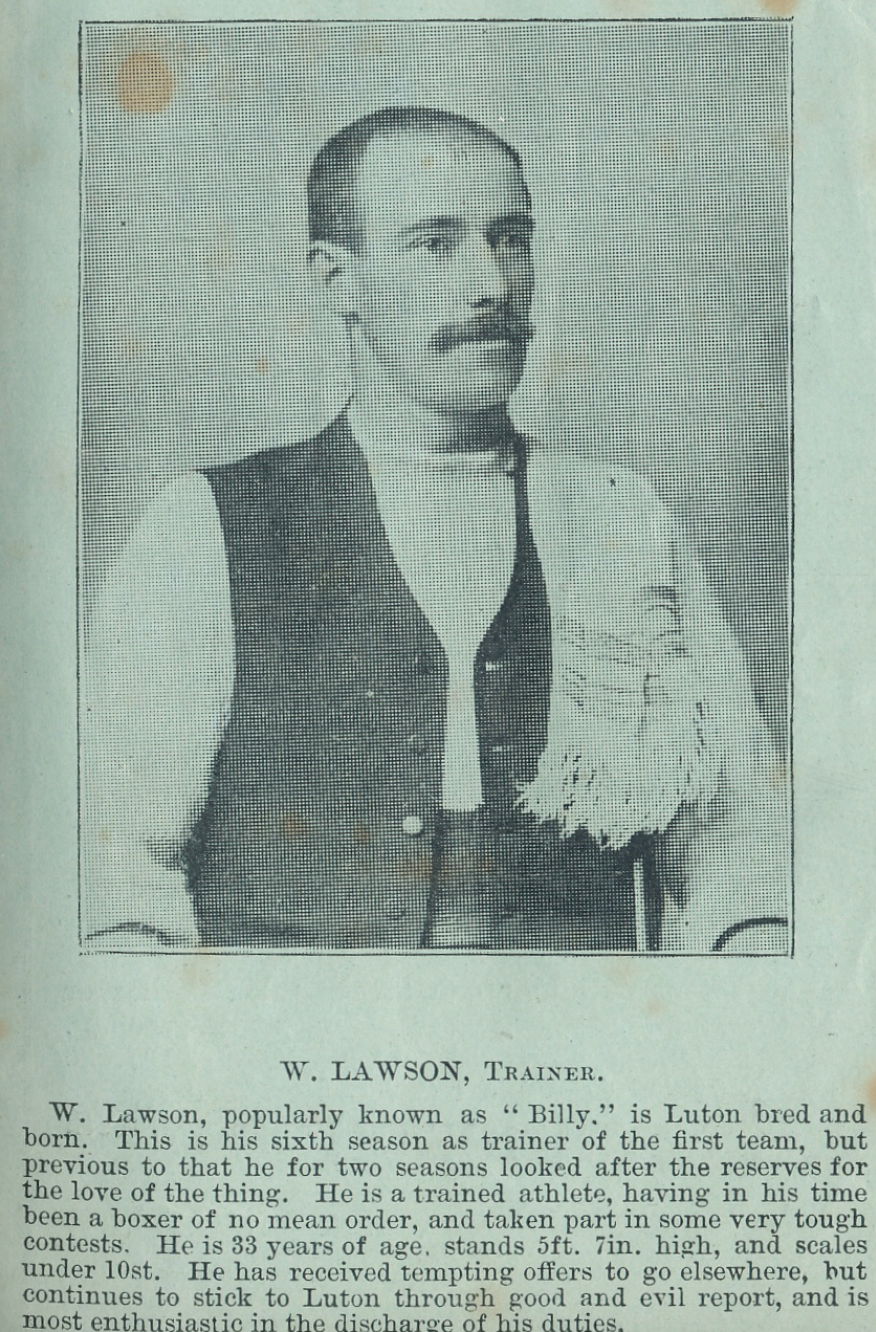
Billy took charge of the training of the reserves in 1893 and from 1895 stepped up to the first team. As a player, he appears to have only played for the reserves, as goalkeeper.
To give some background, there is little evidence of any fitness training or talk of tactics up to 1892. When J.W. Julian arrived from Royal Arsenal in 1892, he was immediately recognised as a man of tactics and he was appointed captain. In September 1892 the committee appointed George Deacon to the post of “attendant” at 1/- per week. The following season Deacon was appointed the clubs’ first “trainer” at 2/6 per week. The trainer was expected to get the team fit, treat injuries, give massages and usually to wash the kit.
While conduct on the field was largely left to J.W., the committee had the final word on selecting the team. The club was run by a committee then from 1898 by the directors. An odd arrangement where the club captain was largely relied upon to deal with tactics. The directors (non players) however, were never afraid to comment upon any aspect of the game and sometimes made tactical suggestions. This arrangement seems to have been in place until the appointment of the first manager in 1925.
The long awaited Southern League was formed in early 1894 and the Luton Town minute book shows that on the 3rd September 1894 the committee set out their vision of what the training regime should consist of. It was resolved –
“that the Secretary write the players instructing them to put in 1 hour’s training from 6 to 7 on Tuesdays and Thursdays – at the same time instruct the trainer to see that these instructions are carried out.”
A spat with Julian caused the club to release him in the Summer before the League began. Unfortunately, the replacement captain, McCartney was a drinker, as were many of the other signings. There are many entries in the minute book which show about half a dozen of the players were disciplined during the course of the season. Whether it contributed to losing out on the title we can only speculate. While the club had trainers to try to get the men fit, McCartney did not set a good example to the players.
The club minute book entry for 26th August 1895 shows that the club committee actually tendered for the position of trainer. Sid Wright offered to do the job for £1 per week, the Luton legend George “Chubby” Deacon” 12/- per week and 2/- for washing the kit. J. Wright and Billy tendered at 10/- a week. After discussion, the Chairman’s casting vote appointed Billy as first team trainer.
Here he is with his trusty companion the towel, and the 1895/96 team at Dallow Lane.
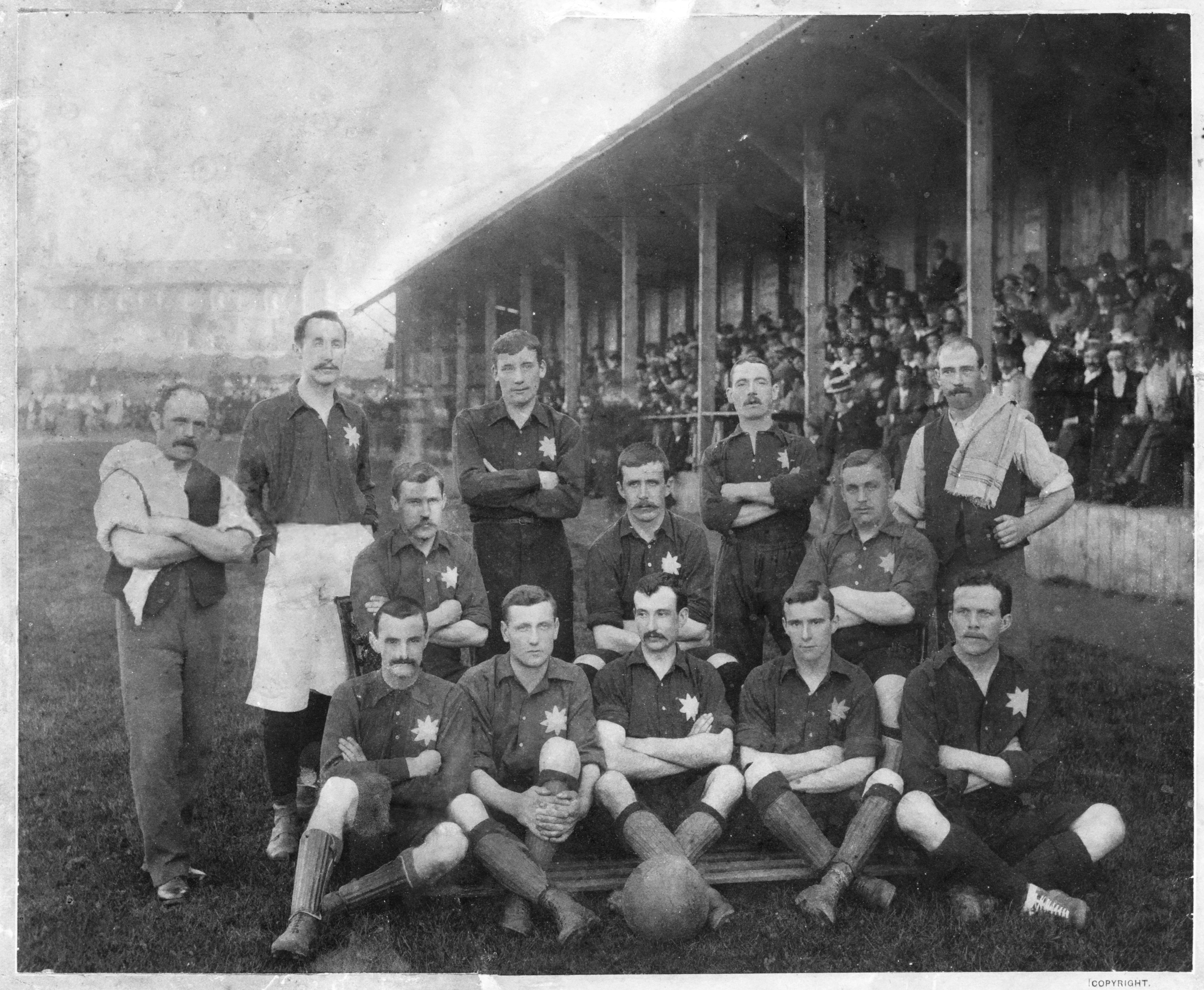
Billy had married Susan in 1888. In 1891 they lived at 33 Windmill Street – he was a labourer in a Plait Shop. He was a drinker too so, like McCartney, did not set a good example. However, Billy was fit and alway led the training himself doing the same training as the players. With his boxing past, I would guess that he commanded a certain respect amongst the players.
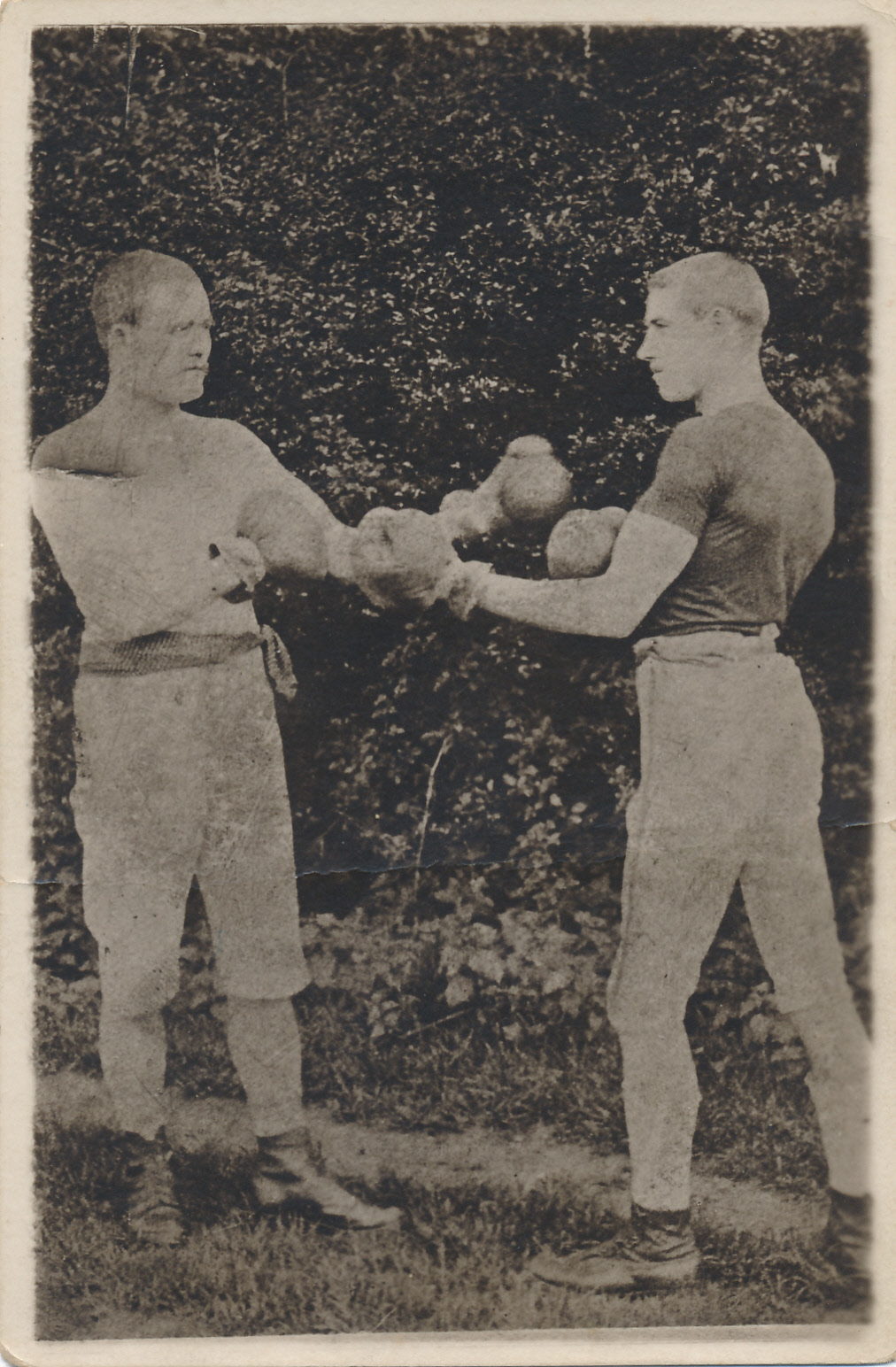
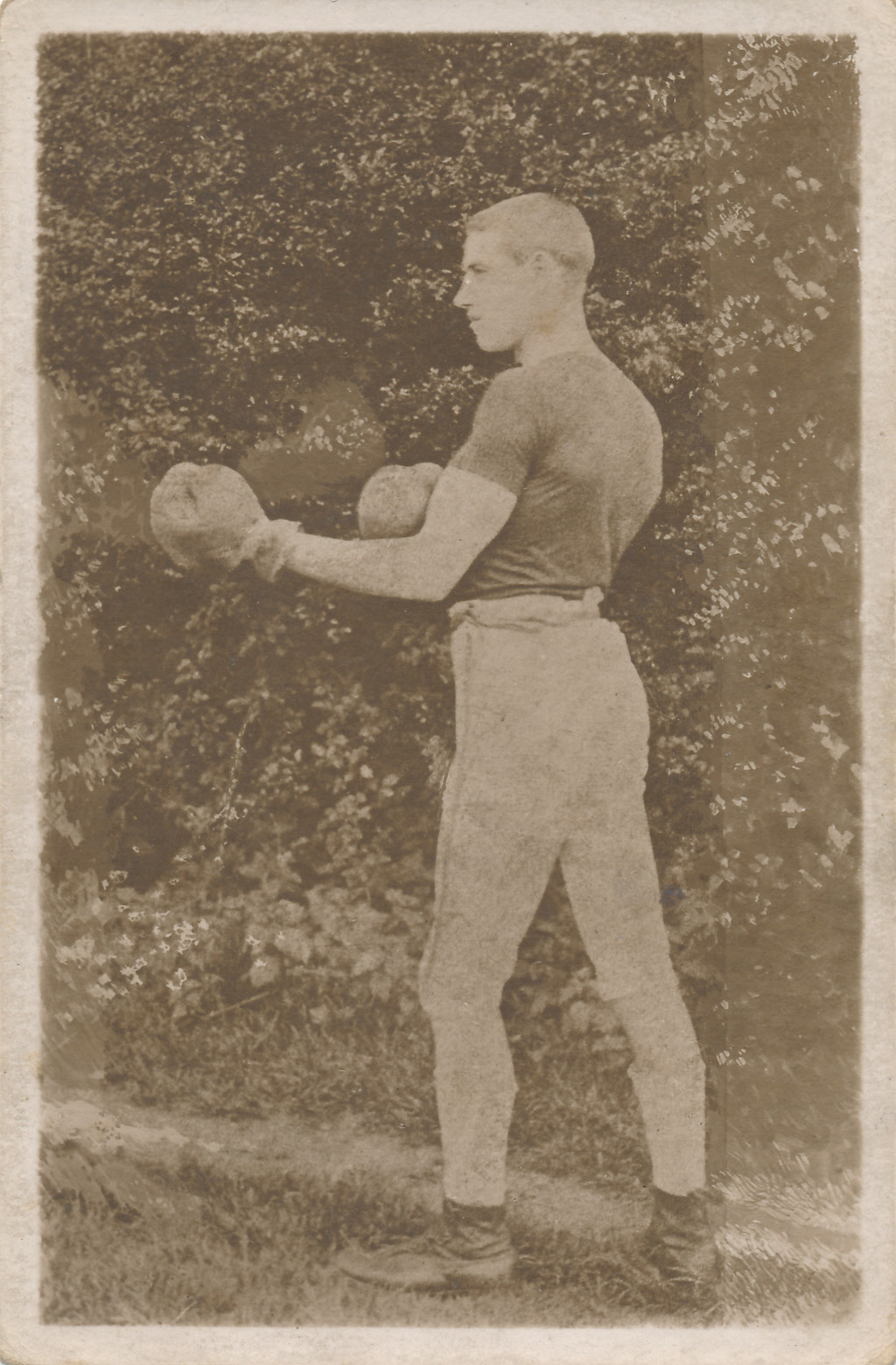
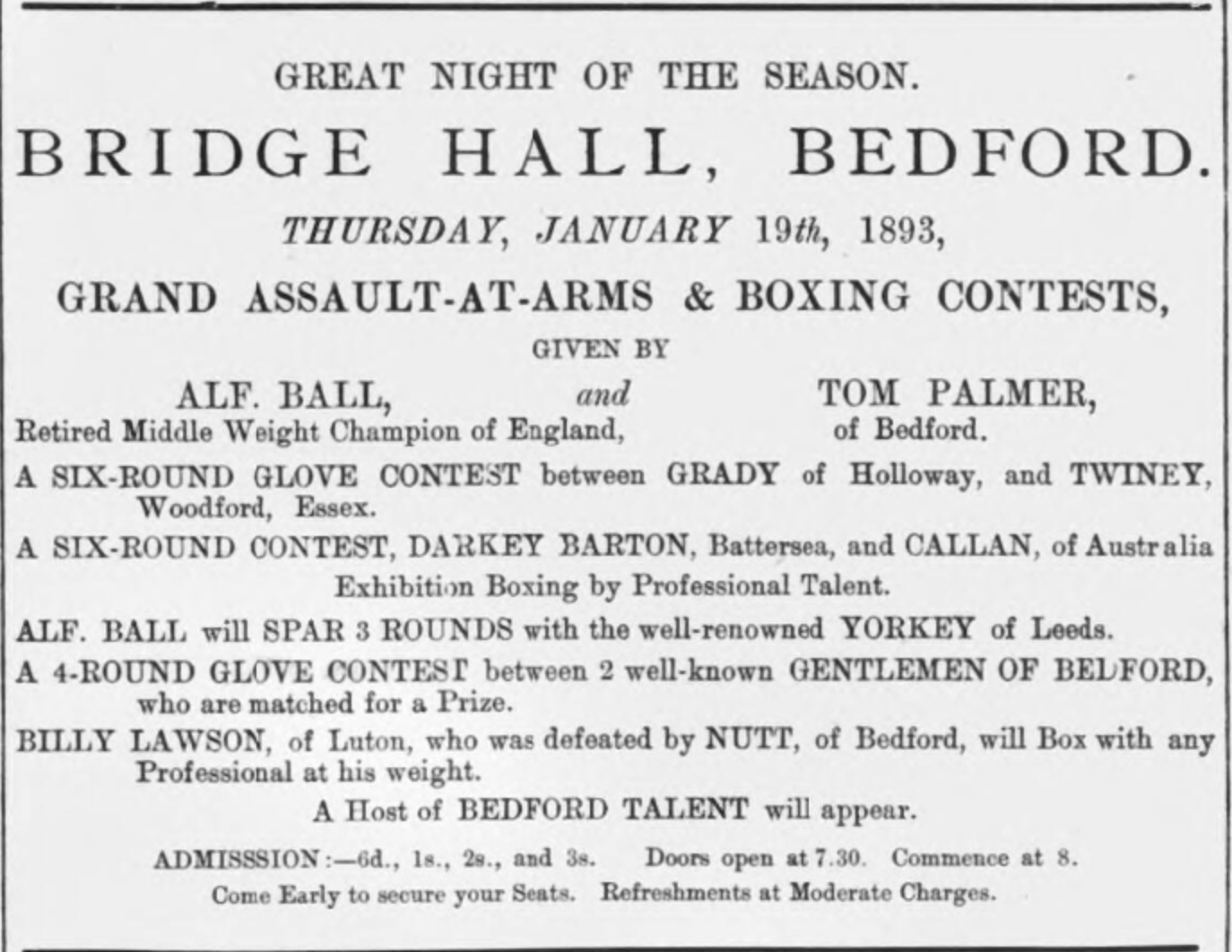
He appears to have been involved in coaching boxing too as indicated by the following photograph.
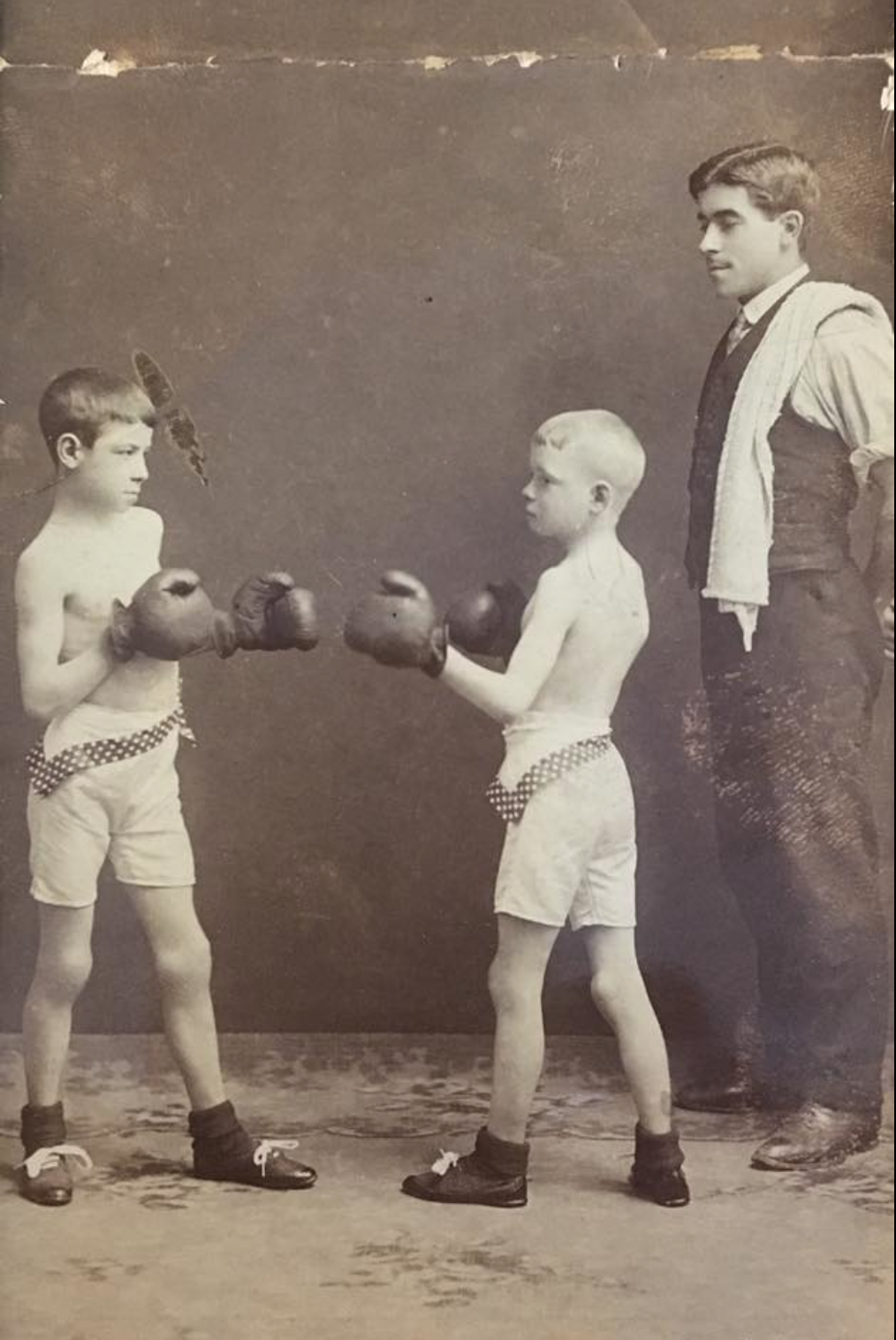
Billy carried on behind the scenes as football trainer being reappointed by the club each season. He appears to have given massages to supplement his income as he was raising a family too. He may have played the odd game for the club as this photo of him wearing the 1896-98 shirt indicates.
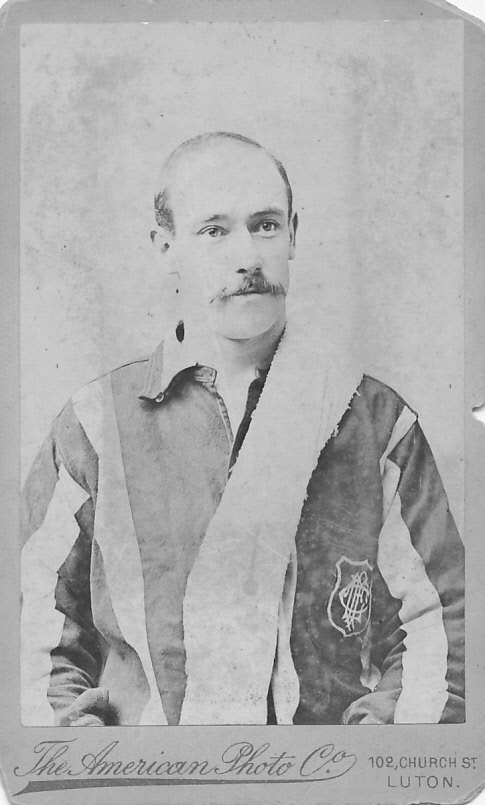
There was a tradition of having a benefit match for Billy each season as a recognition of his efforts for the club. The Luton Times of the 7th September 1900 says that out of the gate of £105, Billy received £10 5s.
This clip from the 11th August 1904 shows the high regard that Billy was held in.
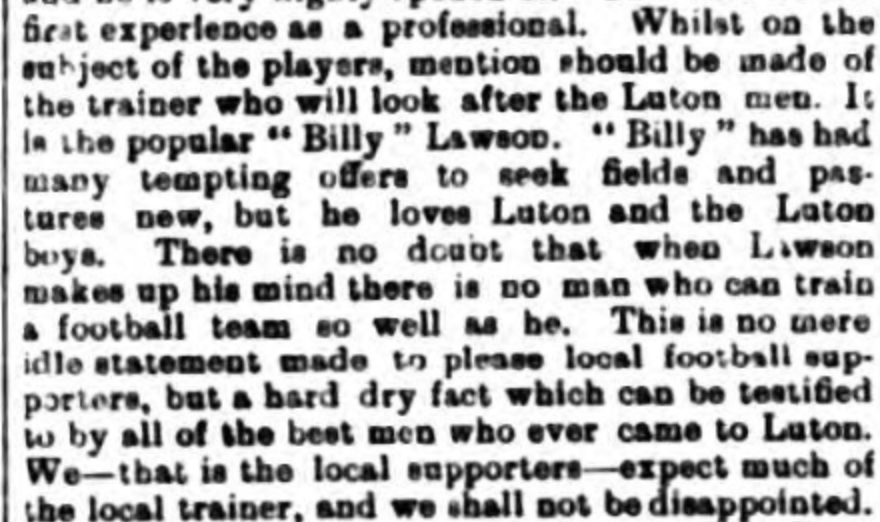
Besides football Billy received recognition for other efforts as the Leighton Buzzard Observer of 27th December 1904 reported –
“An interesting ceremony, illustrative of the good feeling existing between the members of the Luton Borough Police Force and the Burgesses generally, took place at the Police Office a few days ago. It seems that one Saturday afternoon, during the severe spell of weather towards the end of November, P.c. Seaman, who was on duty at a Town football match, was suddenly overcome by the intense cold. Every assistance was rendered by sympathetic spectators, and the unfortunate man was carried to the players’ dressing room. There the club trainer (Billy Lawson) quickly revived his numbed limbs and restored him to consciousness. In recognition of these timely services Trainer Lawson was presented, upon the occasion mentioned, with a handsome pipe.”
What triggered it we do not know, but in March 1906 Billy found God and gave up the drink. The Luton Times of the 12th July 1907 announced the re-opening of the East End Mission in Luton –
“At night a revival service of a fervid character was conducted by Mr Webdale, the speakers being ‘Billy’ Lawson, the Luton football trainer, and ‘Taff’ Charrington. These two spoke of their former lives of pugilism and ‘the pub,’ and of the difference Christ had made; their singing and speaking greatly moved the audience. At the close of the service, eighteen announced their resolve to lead betters lives.”
The local newspapers reported that Billy toured the area speaking to meetings. The Luton News of 25th October 1907 reported upon some Luton visitors to Hockliffe Congregational Chapel including Billy Lawson. Billy had found God the previous March and spoke to the congregation about his conversion.
The Biggleswade Chronicle of 15th July 1910 reported that –
“On Sunday, Cox’s happy Family, from Luton, paid the Primitive Methodist Chapel their annual visit. They were accompanied by Billy Lawson the Luton Town F.C., trainer. The congregations were large.”
Billy stayed in touch with the Boxing fraternity as this clip from the Luton reporter of the 3rd December 1908 shows –
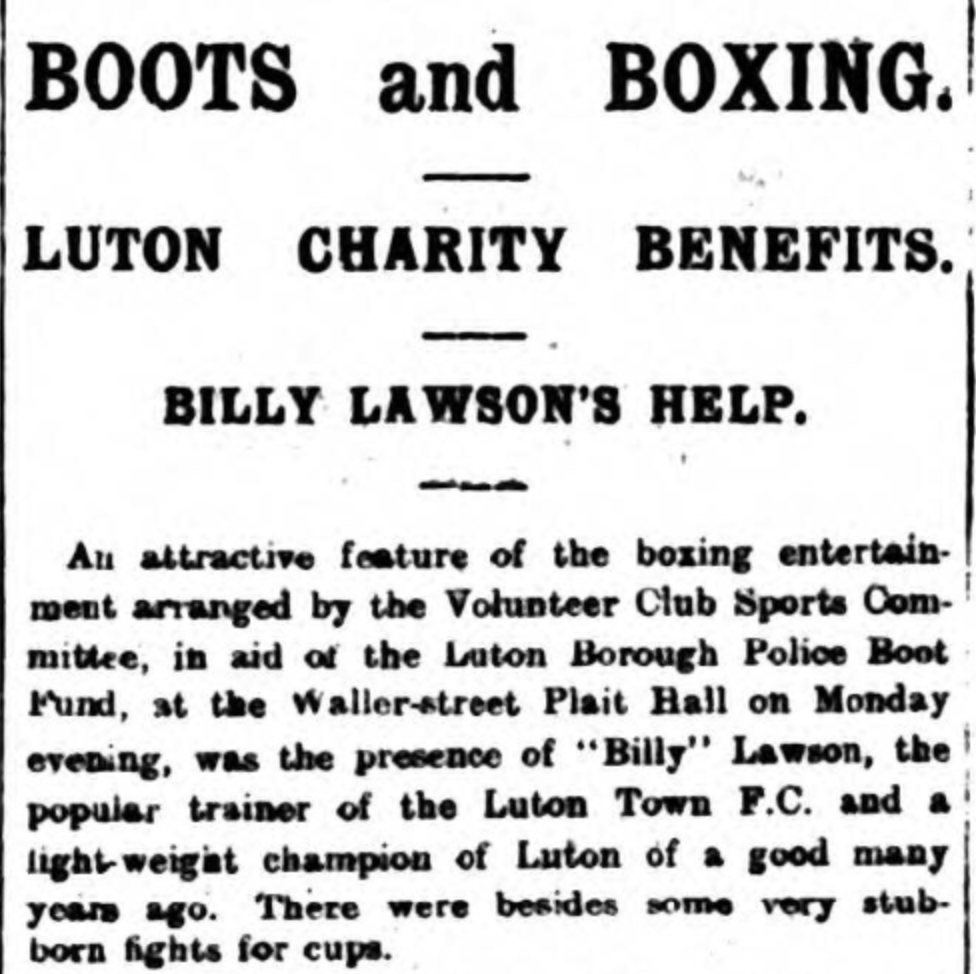
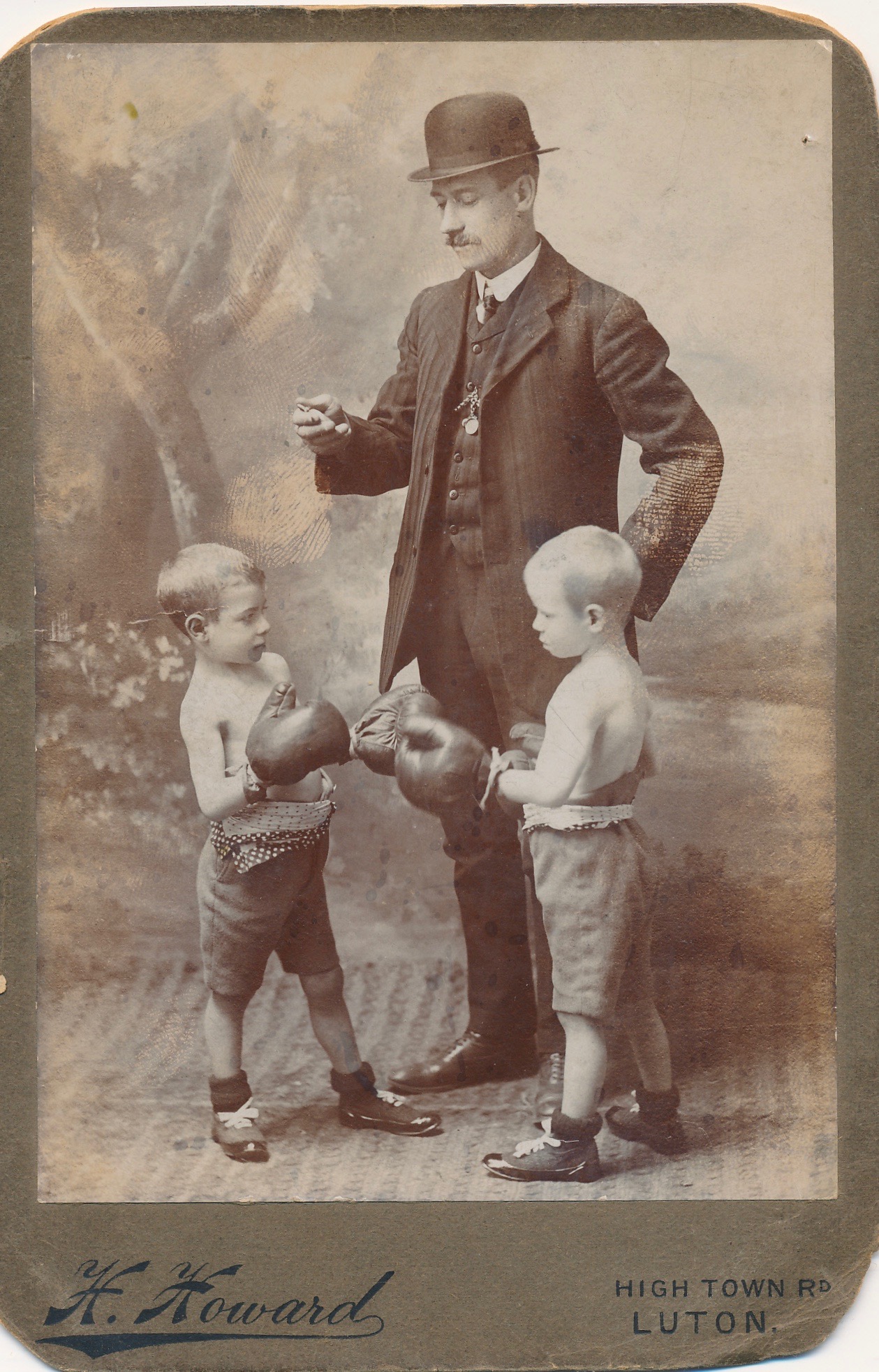
The Luton Times of 16th September 1910 highlighted Billy’s talents as a football trainer –
“On Saturday at Southend the score at half-time was level at one all; but after the interval they played up better than ever, and put on three more goals to their opponents’ nil. The fact is a credit to the men themselves, and also to their trainer, ‘Billy’ Lawson, who certainly deserves more than a word of praise.”
Billy concentrated on the fitness of the players, not tactics. He was quoted as saying “I’ll make ‘em fit if they’ll be made fit, but they are supposed to know more than I do about play.” As the football cliche’s goes – he knew his limits.
The 1911 census describes Billy a “football Trainer” living at 26 Brunswick Street with wife Susan a Straw Hat Manufacturer. They had 3 daughters and five sons – Lillie born 1890, William born 1892, May born 1893, Charles born 1895, Walter born 1897, John born 1904, Bert born 1905 and Susan born in 1910. Billy’s wife, Susan is described as a Straw Hat manufacturer, Lily and May were both Straw Hat machinists, William a Straw Hat stiffener and 16 year old Charlie an errand boy.
The Biggleswade Chronicle of 14th April 1911 reported on a benefit match for Billy between Luton reserves and Croydon Common. “It was by no means a great game but a goodly crowd patronised the match and tickets also sold well so that Lawson should derive some substantial benefit from the match.”
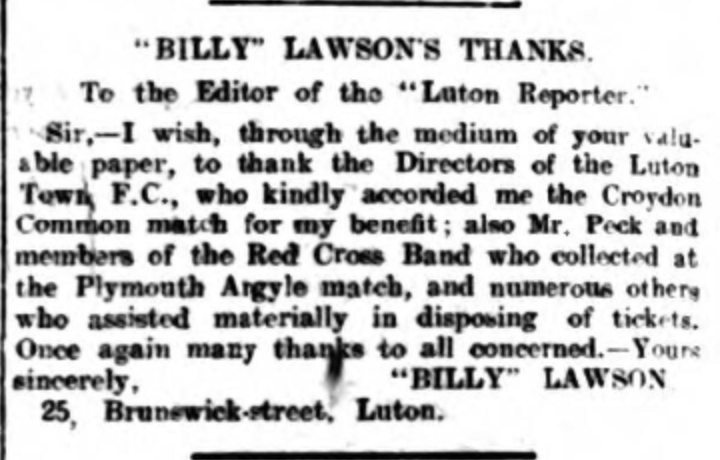
Billy continued speaking about his conversion as reported by the Beds Times of 26th May 1911 –
“On Sunday ‘Cox’s Happy Family’ of Luton, under the leadership of Mr Clarke, paid their annual visit to Stotfold. The Primitive Methodist Chapel was crowded to overflowing. Of course, ‘Billy’ Lawson, the Luton Town Football trainer, was one of the party, and in the evening he related the story of his conversion with great effect.”
Easter Monday 1912 saw tragedy on the pitch. Luton were playing at Brighton when Sammy Wightman received a kick to the stomach. Billy treated Wightman for being winded but he saw that it was more than that. Wightman walked off the pitch indicating it was not a serious injury. However, Billy could see that it was bad and called for a doctor. Two attended Wightman in the dressing room and it was decided to get him back to Luton as soon as possible. He became worse on the journey home and was attended by Doctor Rose in his home at 66 Reginald Street. He was later transferred to the Bute Hospital. A surgeon was called for from London and a serious operation was performed on Tuesday evening. Wightman was delirious in the night and being a powerful 13 stone athlete, the nurses could not cope as he tossed and turned in agony. Billy therefore sat by Wightman’s bed side all night watching over him. The Luton Reporter –
“In his periods of sensibility, Wightman chatted quite rationally about football matters, more especially concerning the length of his enforced retirement from the game and who would fill his place in the team, and it was quite evident that he had not the slightest suspicion that he was in extremis. It was the same on Wednesday morning, even when the possibility was tactfully suggested to him before his depositions were taken. As a matter of fact, he remained conscious up till about five minutes before his death. The one chance was that his vitality would hold out for twenty-four hours after the operation, but all Wednesday morning he was sinking, and he died at quarter past one in the afternoon.”
War came and Billy and Susan’s three oldest sons went off to serve their country. The Luton Times of the 31st October 1915 –
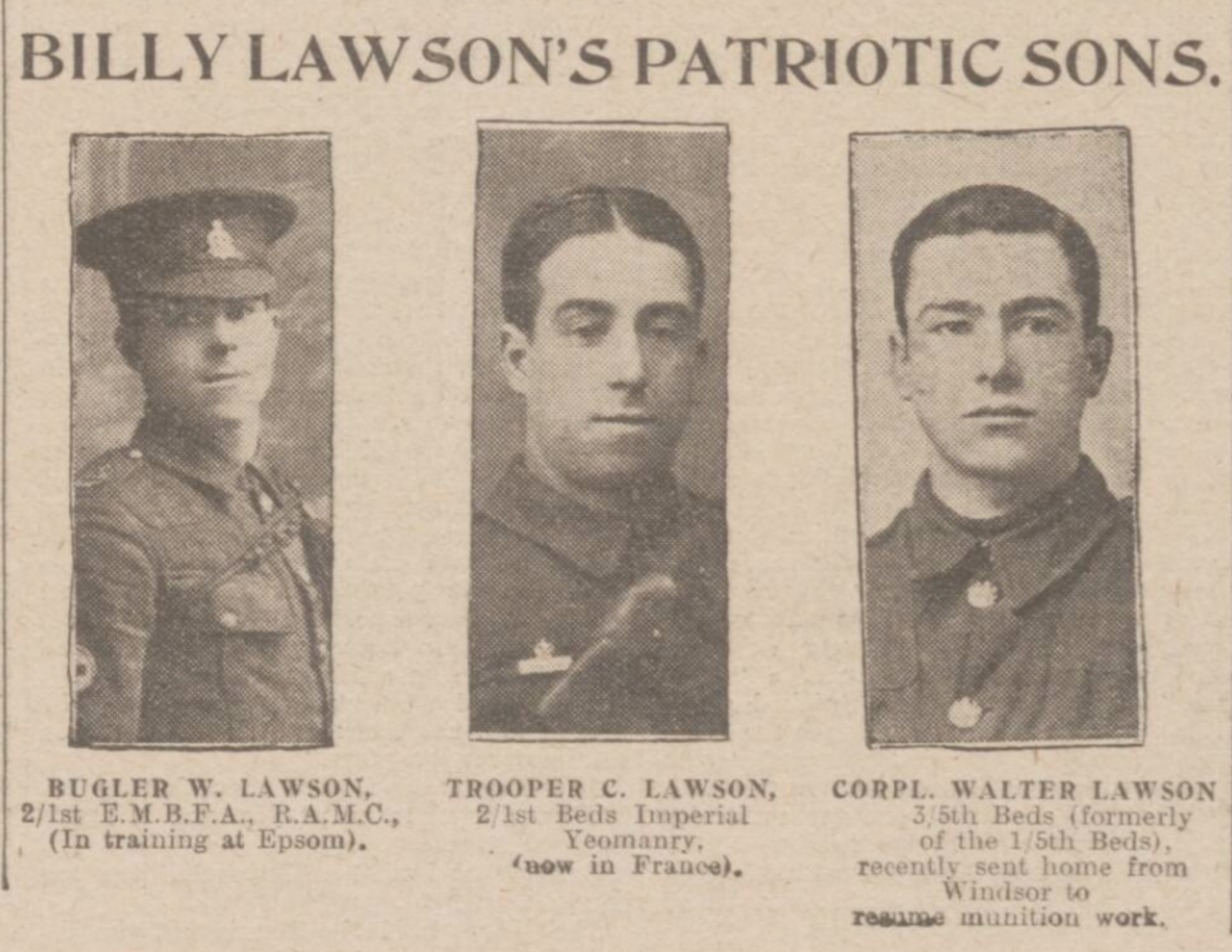
The Luton News of 1st November 1917 brought worrying news for Billy and his family.
“The news that ‘Sonny’ has been dangerously wounded will be received with regret by all followers of local first class football. It was by this informal appellation that Pte. Wm. Lawson, son of Mrs and ‘Billy’ Lawson, the ever-popular trainer of the Luton Town team, was known. The family, who live at 25 Brunswick-street, Luton, have received a telegram, the brusque wording of which was:-
“Regret inform you Pte. W. Lawson. R.A.M.C., reported 27th Oct, dangerously ill 3rd Canadian Casualty Clearing Station, France. Gunshot wound thigh, fracture left thigh bone. Regret permission visit him cannot be granted.”
Pte.. Wm. Lawson was serving in France with the stretcher-bearers of a field ambulance corps. He joined up early in September, 1914, prior to which he had sometimes turned out for the town. Pte. Walter Lawson, ‘Billy’s” youngest son, did good service against the A.S.C. on Saturday. He has been discharged from the Beds Regt., and offered his services a second time, but was rejected.
Another brother, Pte. Charlie, has been in France over two years, and is still serving there.
It is hoped that Pte. Wm. Lawson will make a good recovery, and sympathy will be extended to his family in their anxiety.”
However, the Beds and Herts Telegraph of 3rd November 1917 gave the terrible news of the death of Billy’s son, William –
“It will come as a shock to many to learn the death of Pte William Lawson, of 25 Brunswick Street, Luton, after being severely wounded on the Western Front. Sincere sympathy will be extended to Luton Town FC trainer Billy Lawson, his wife and family in their great loss. Their son was in the R.A.M.C., and at the time of his death was serving as a stretcher bearer in a field ambulance corps.”
The following letter appeared in the Luton News of the 15th November 1917, just days after receiving news of Sonny’s death. Why Billy found it necessary to defend himself we do not know. It may be that with the terrible casualties of 1917 came a wave of finger pointing at those seen as not doing their “bit”. Here is Billy’s letter –
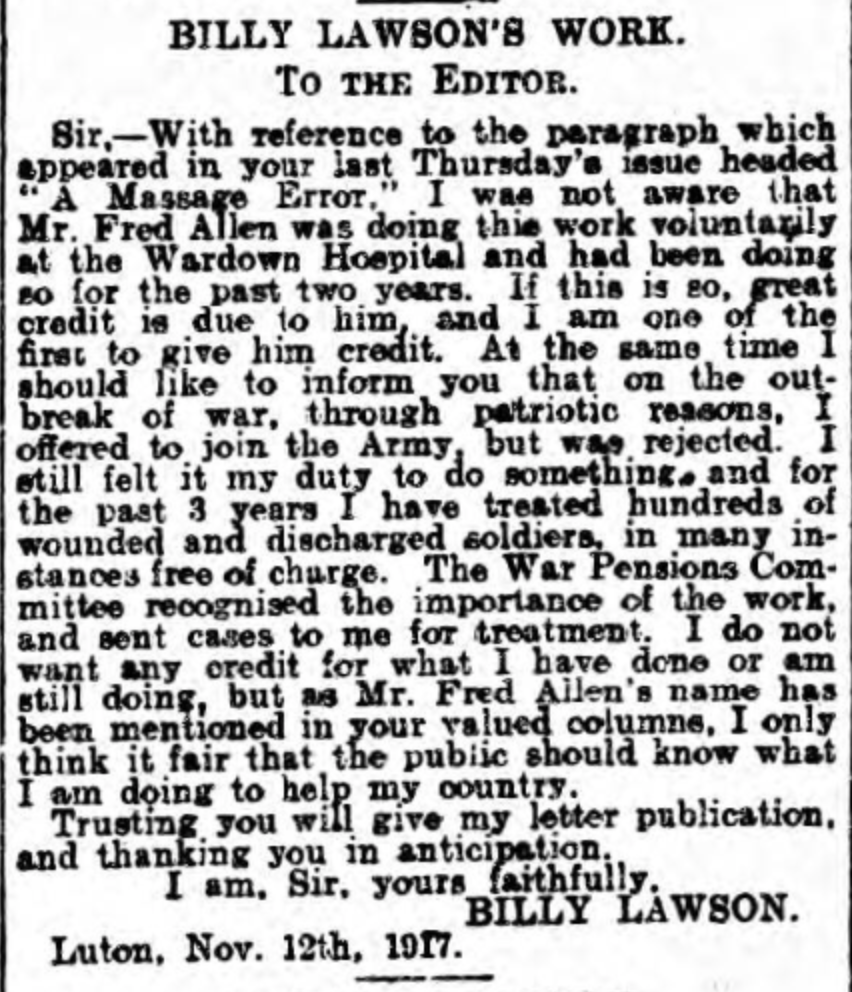
Football continued during the war and Luton Town won the Southern Charity Cup in 1915. They actually drew the final 0 0 with Plymouth Argyle but there was no replay so the title was shared. It appears that the club struck a medal for Billy.
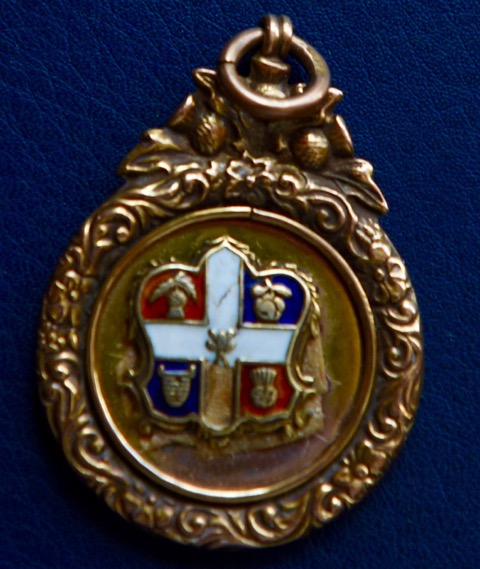
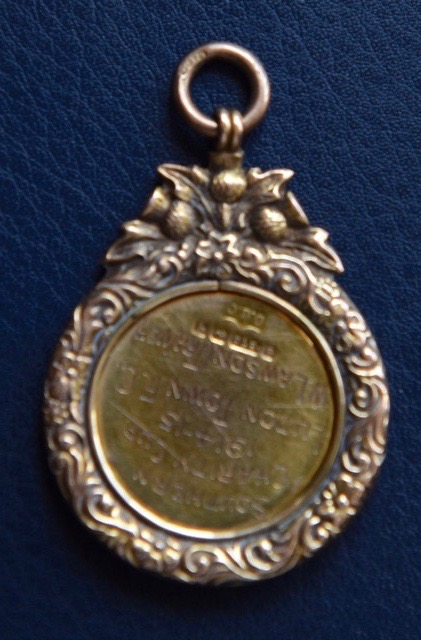
War ended and Billy’s pre season training regime was reported on by the 14th August 1919 edition of the Luton News, my comment is in square brackets –
“The players, under the admirable coaching of Mr “‘Billy’ Lawson (trainer), are settling down to the strenuous training, necessary before the matches proper, in a very ernest fashion. To use Billy’s own words “There’s not a lazy man among them,” and every one is displaying a great enthusiasm.
Morning walks and runs, skipping, punch ball, jumping and “shooting for goal,” are not easy in the terrible heat we are now experiencing, but there is not one slacker, despite soft blisters and soreness consequent upon hard training after a long rest. Billy is proud of them, and incidentally, they are proud of Billy. They speak admirably of their trainer and his system, and think him a wonderful man. He is!
For the last two or three mornings the players have been taken for six mile runs – and Billy always leads [he was 52 years old]. I saw him run in first yesterday – perspiring freely ’tis true – but certainly looking as fit as any of the others. “He’ll beat any young ‘un,” remarked a new enthusiast.
In the afternoon the players put in two good hours on the field at skipping, punch ball etc, Tuesdays, Wednesdays, Thursdays and Fridays are the days of general training, but many, principally the local men, put in a lot of time in the evening.
Bob Hawkes, Fred Hawkes, Bates, Stewart, Hensman and Elvey having been putting ‘time in’ during the week.
Bowler, Grimes, and Furr have not yet put in an appearance but ‘Billy’ has been assured they are doing strenuous training at their own homes. They will, however, join shortly.
In view of the fact that the first League game – with Swansea – is on the 30th of this month, there is no time to be lost, and ‘Billy’ is even sacrificing private work in order to get the men fit – as he will do – for the matches proper.”
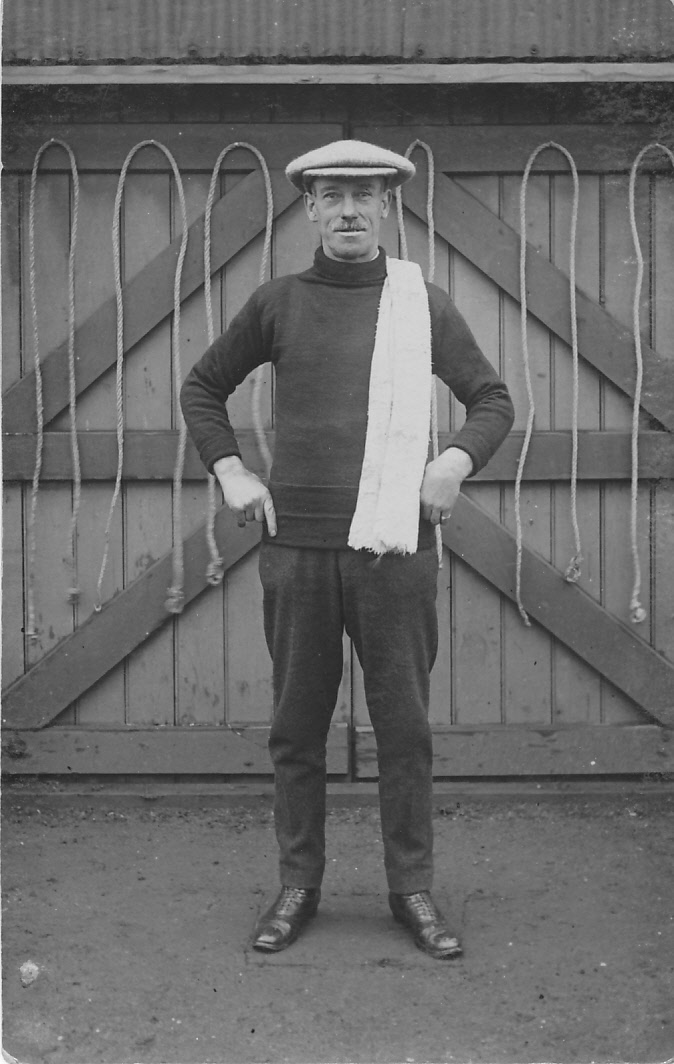
The Luton News of the 2nd October 1919 revealed a secret weapon to add to Billy’s training skills –
“The Town players did not spare themselves in any way, and whatever the effect of Billy Lawson’s grog (non-intoxicant) which Rutherford said was necessary for himself before the game, I am sure Seymour’s accident did more to invigorate the Town players than anything Billy has brewed in his most inspired moments.”
The match report remarked on the stamina of the Town players and gave credit to Billy’s training methods.
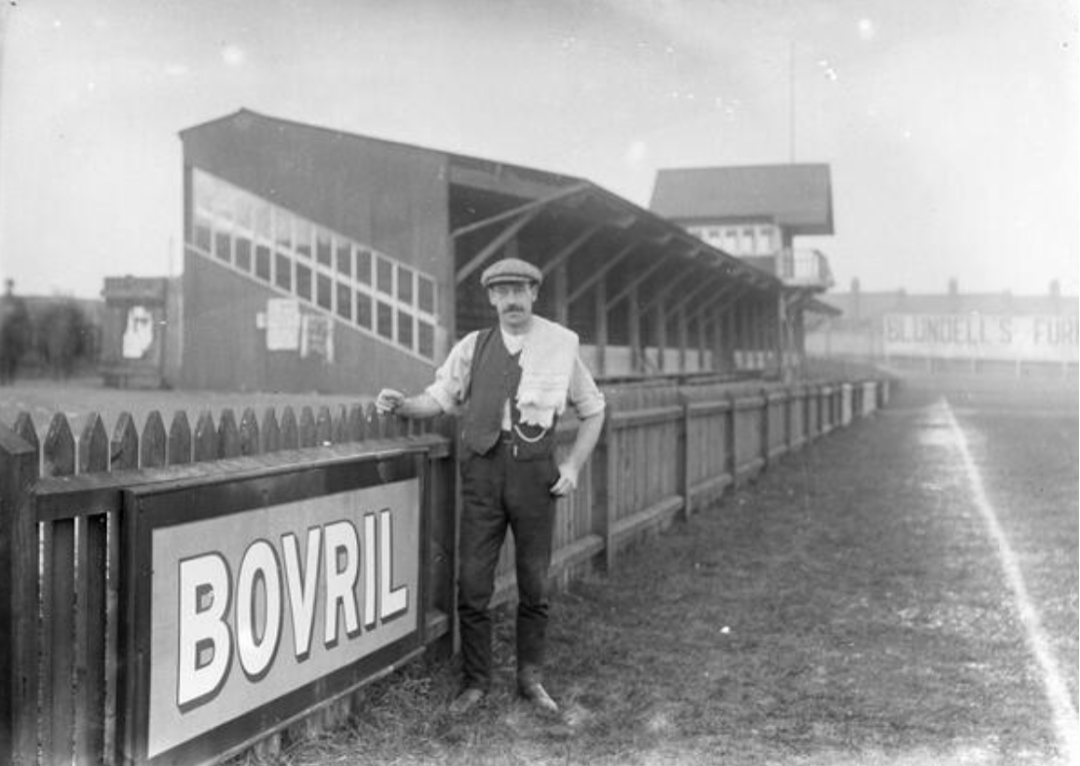
Billy at Kenilworth Road with the main stand behind with the Crow’s Nest. Oak Road with the “Blundell’s” advert in the background.
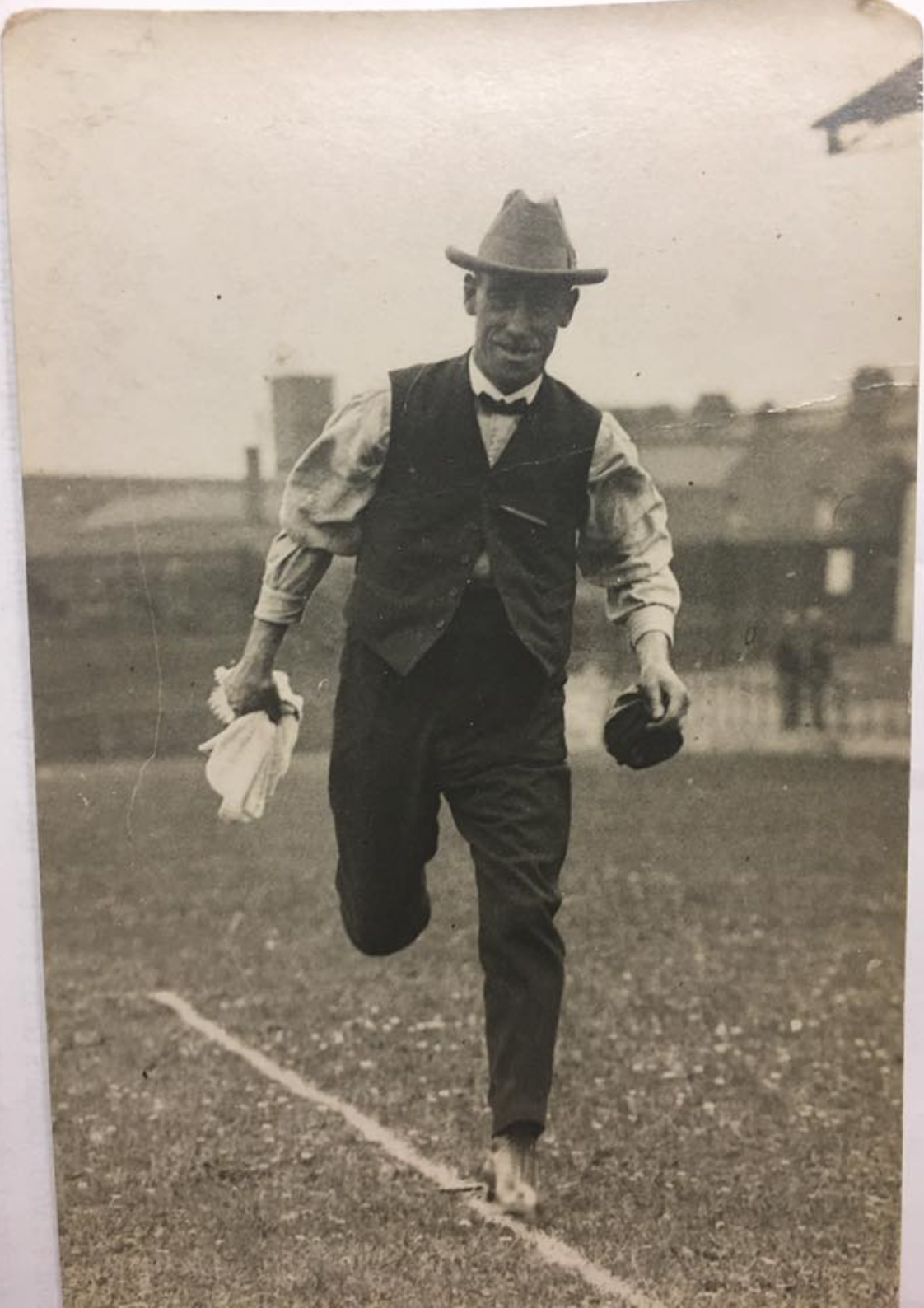
After 30 years, it was time for Billy to hang up his towel and the Luton Reporter of the 11th May 1923 announced his retirement –
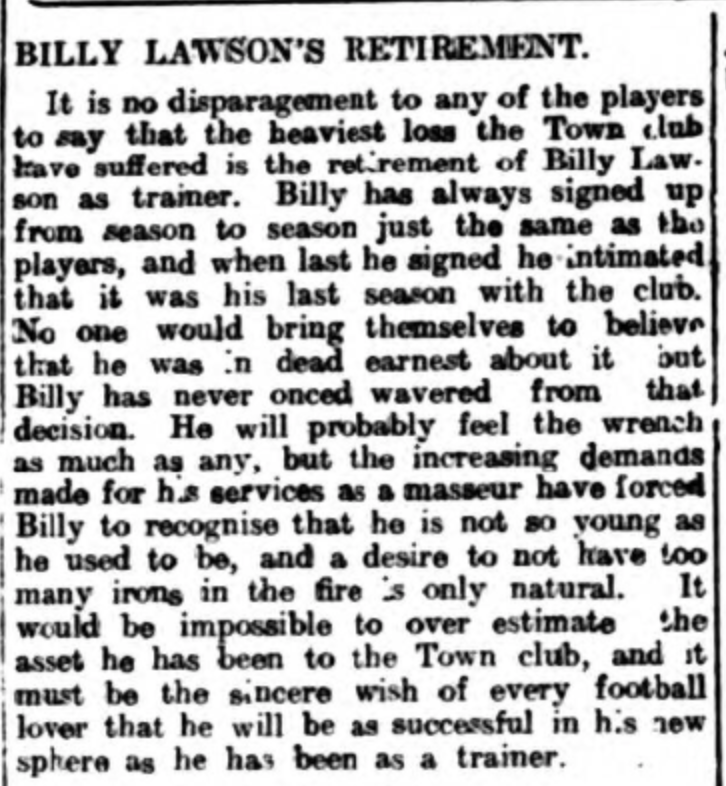
His final benefits included a number of fund raising events.
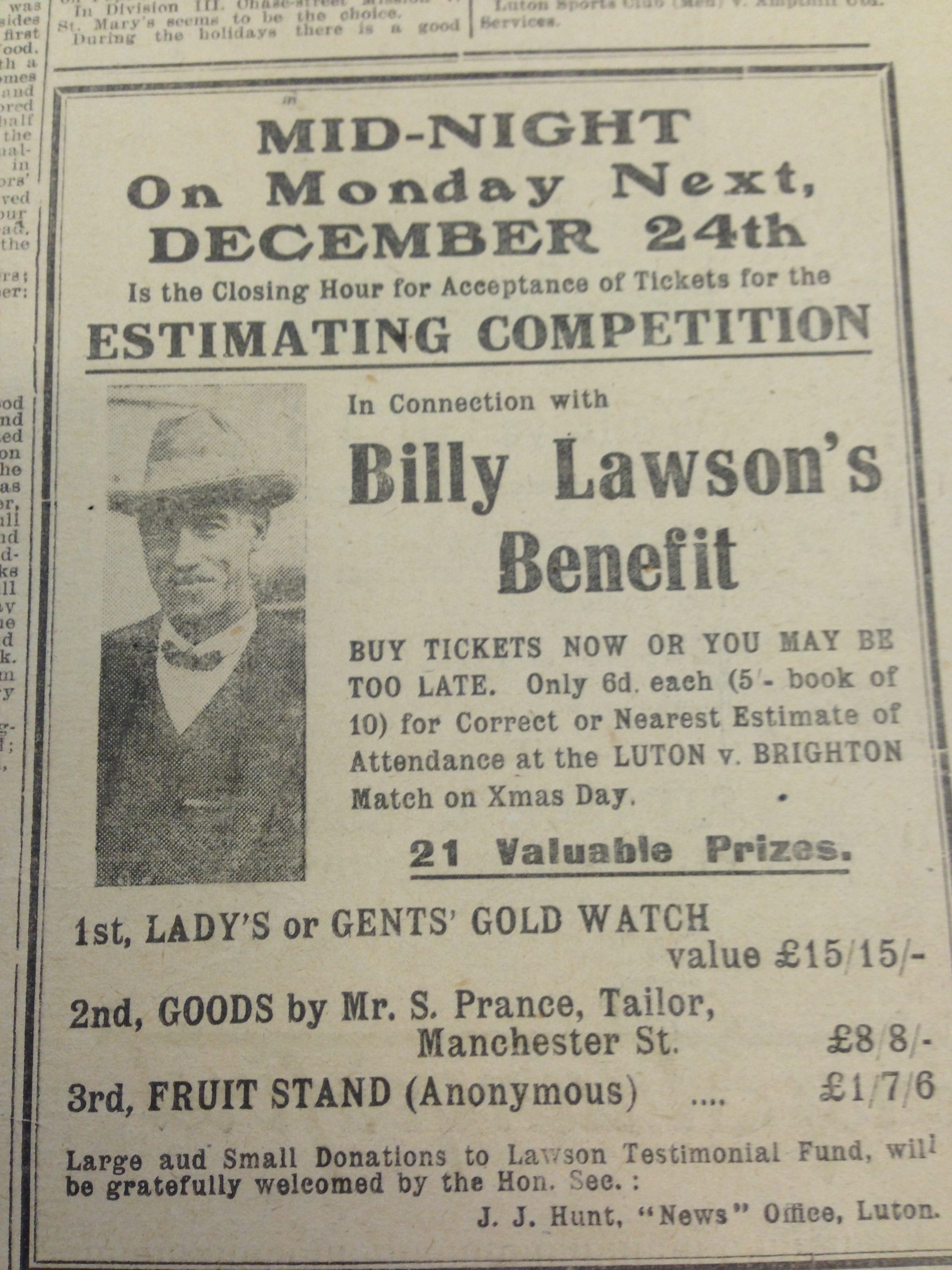
Ernie Simms came down from South Shields to play in Billy’s benefit match in December 1923.
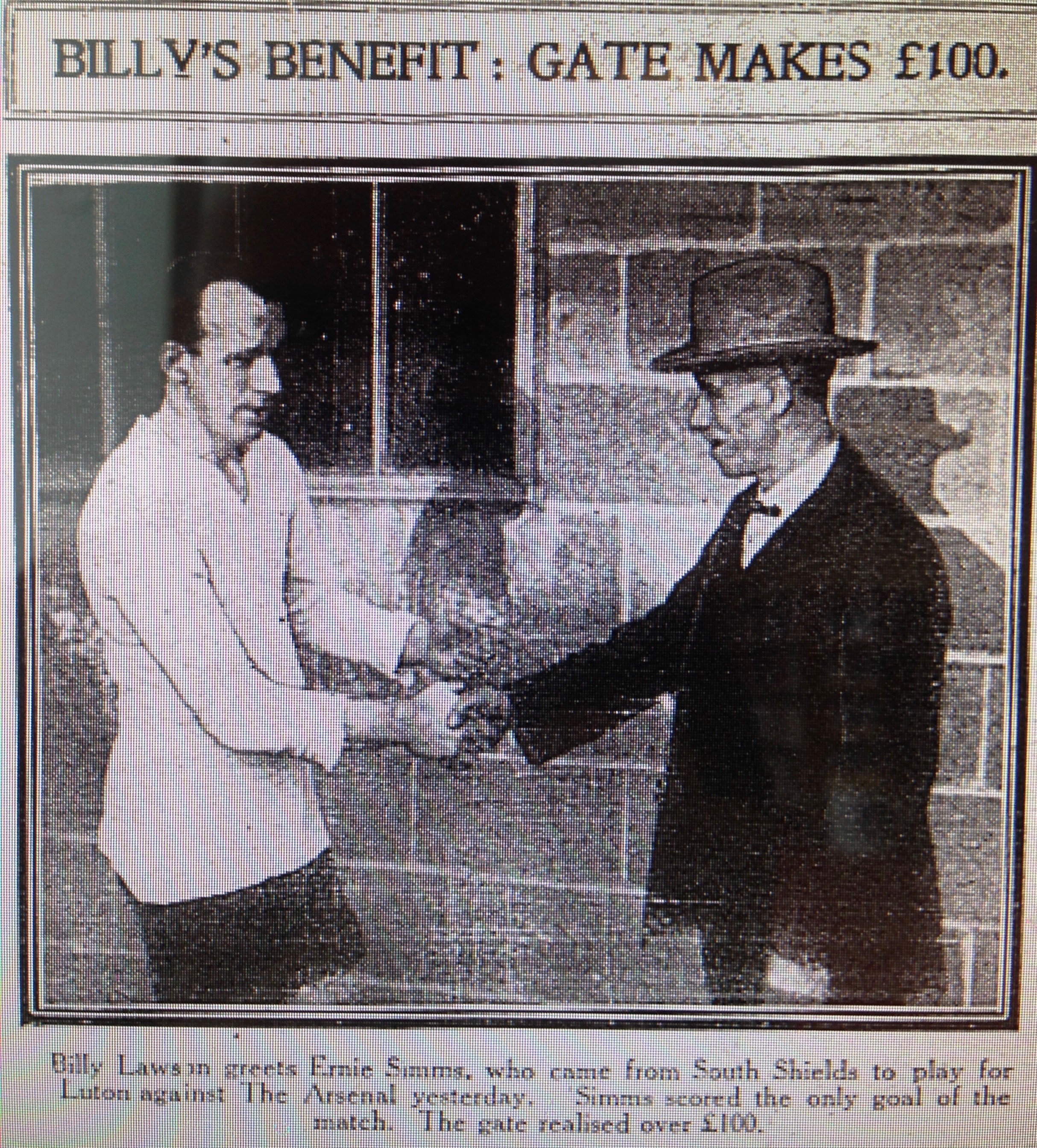
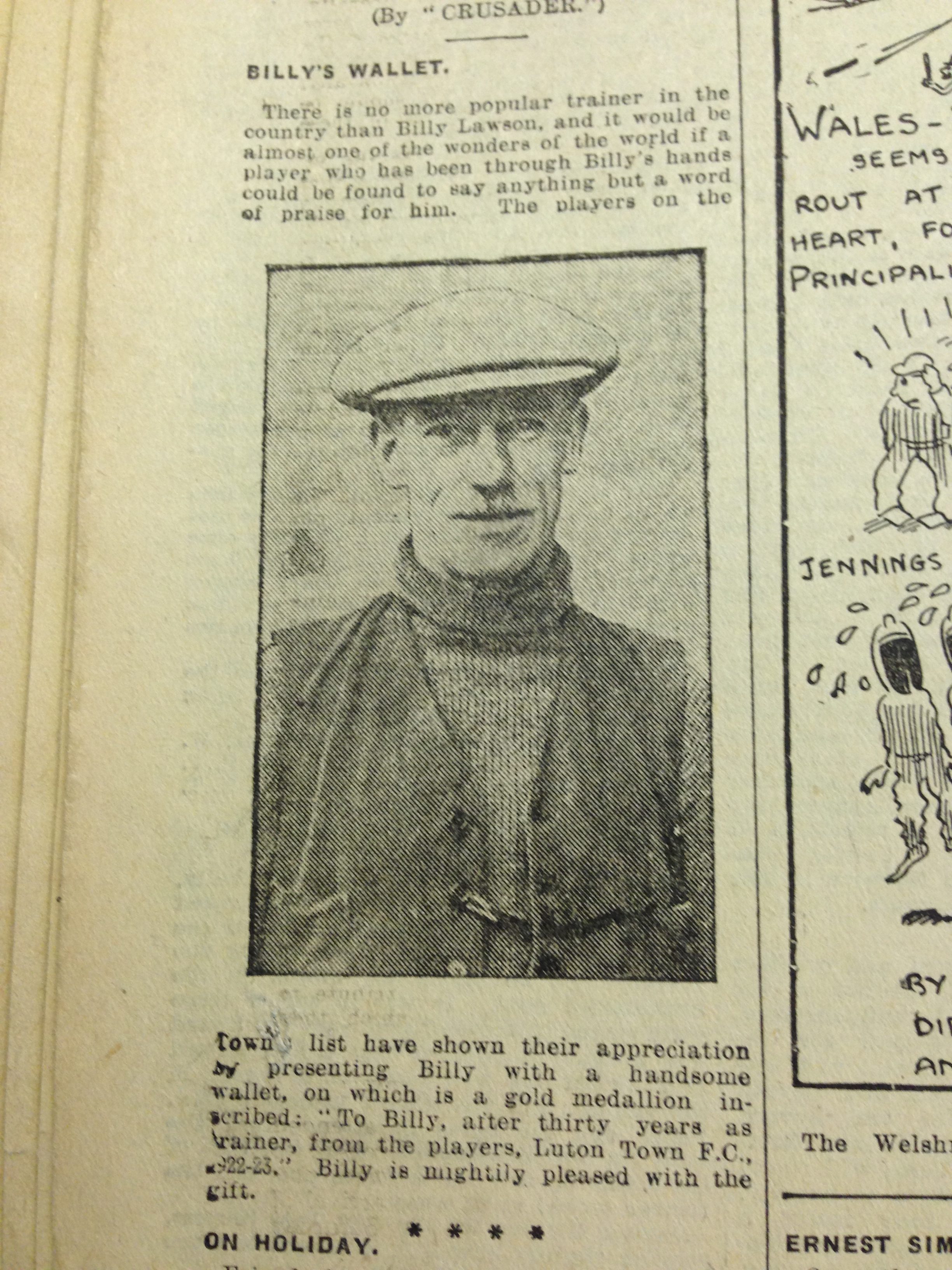
The above clip is from the Pictorial of 4th December 1923.
Billy and Susan appear to have enjoyed life outside of football
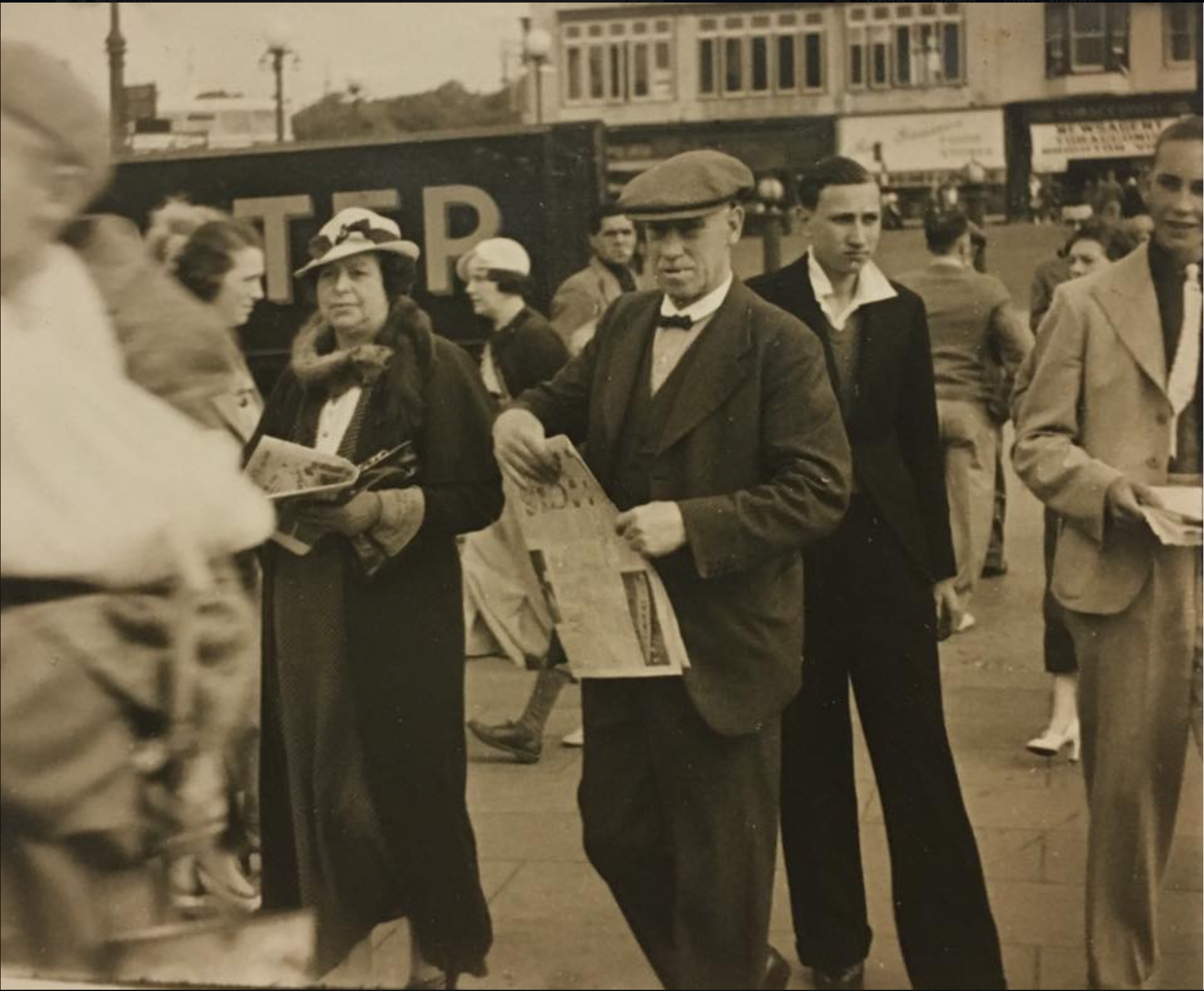
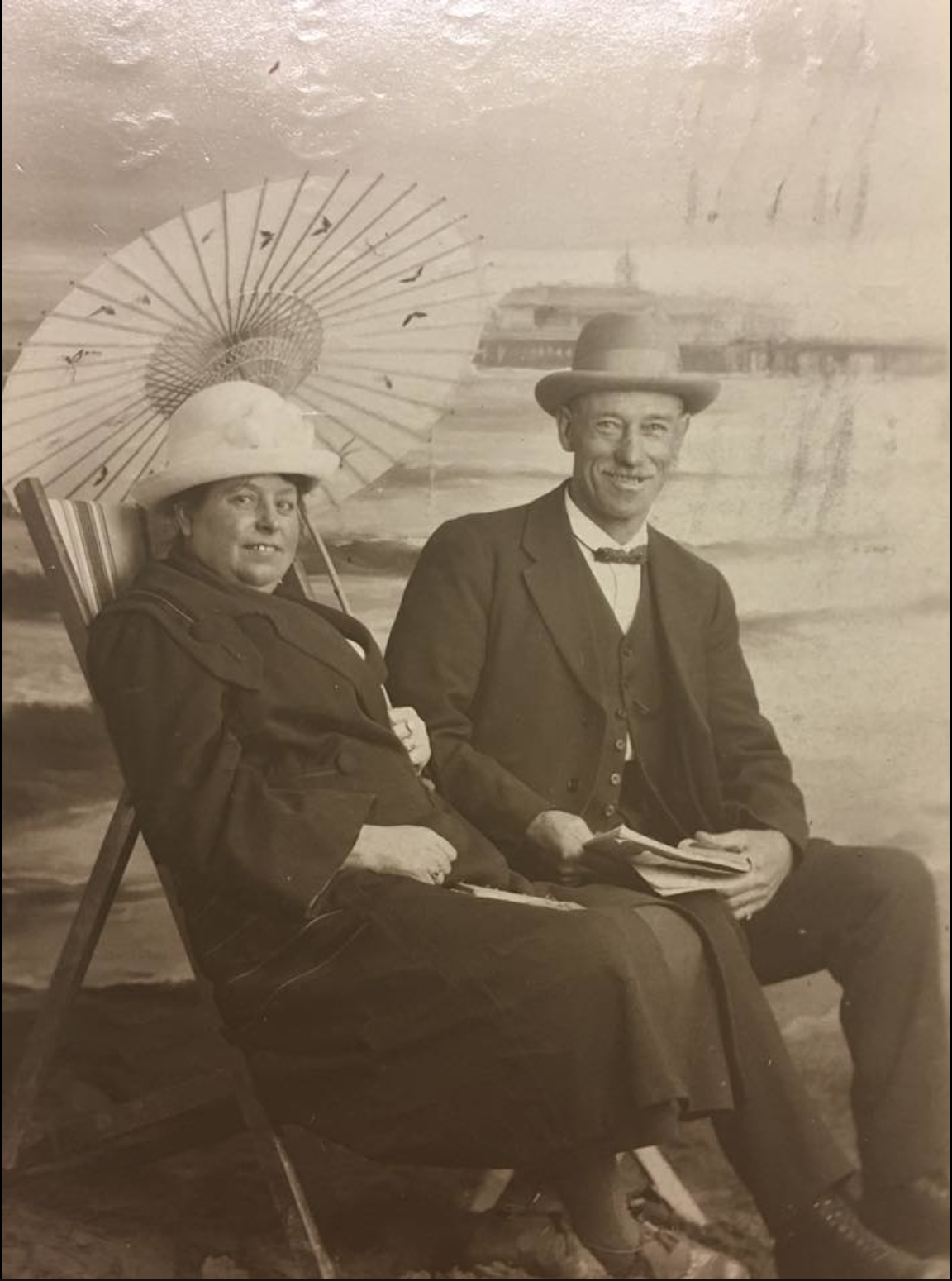
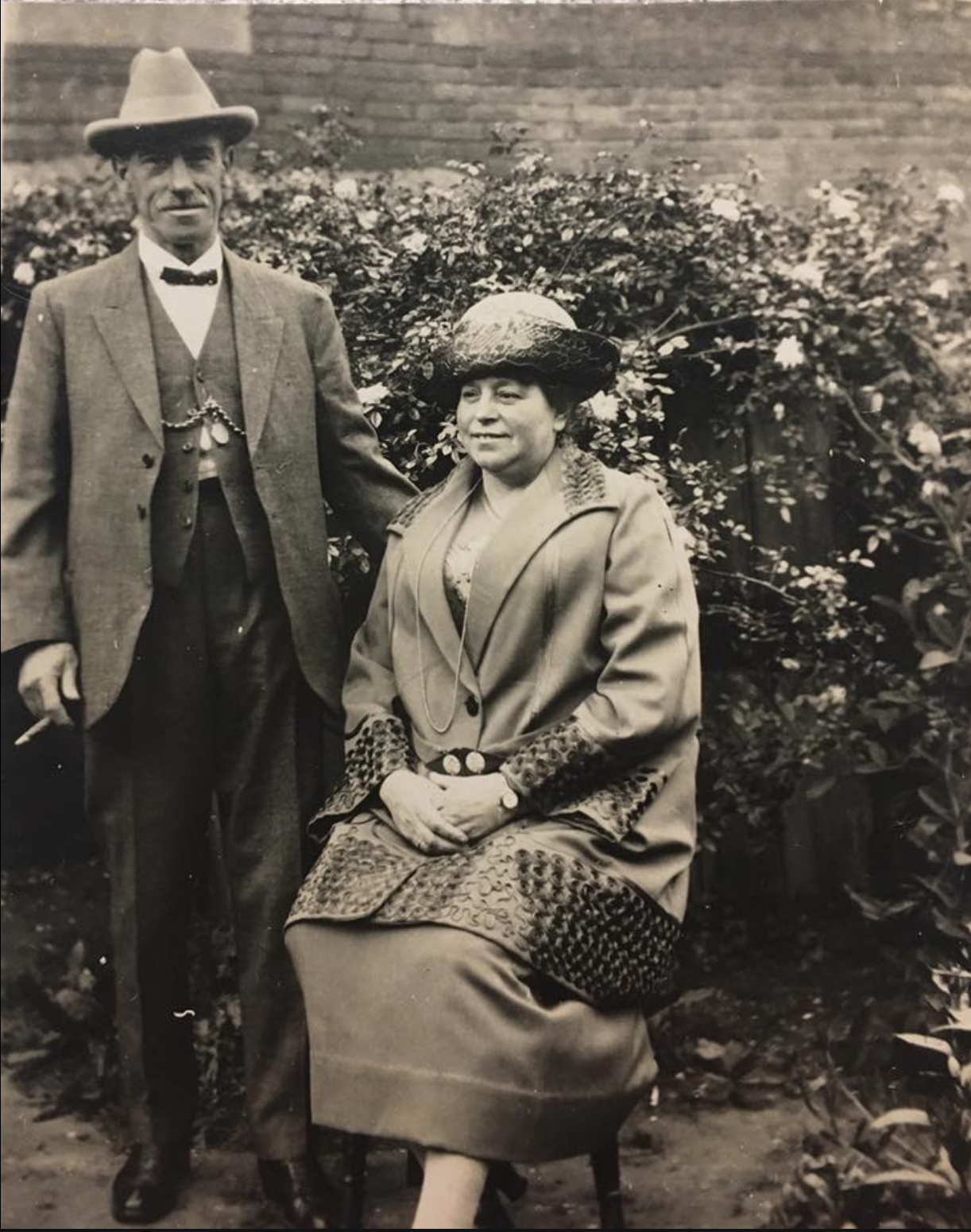
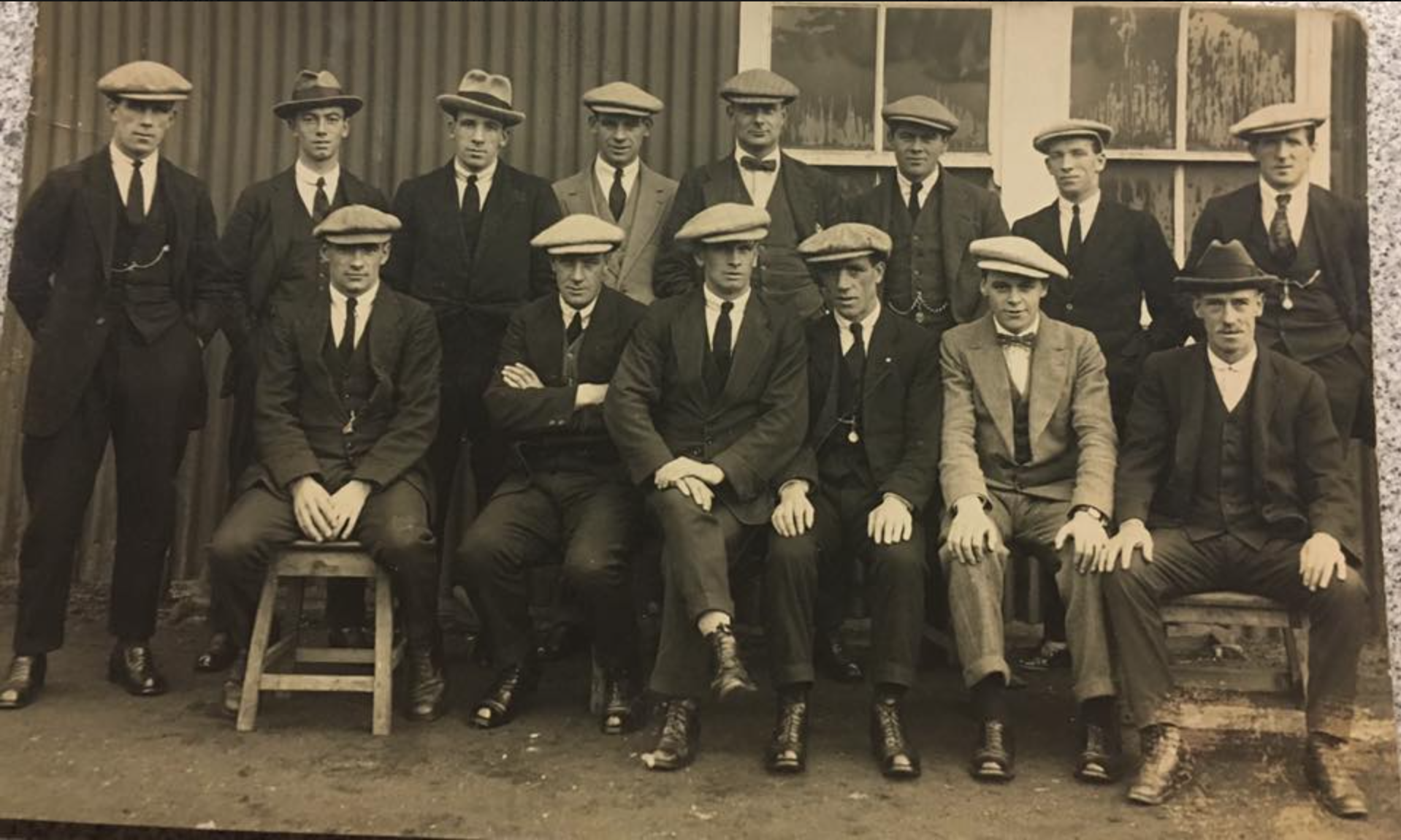
When Billy’s son was appointed trainer/coach for Letchworth Town, the Luton News of the 27th July 1939 gave Billy one last appearance in the spotlight.
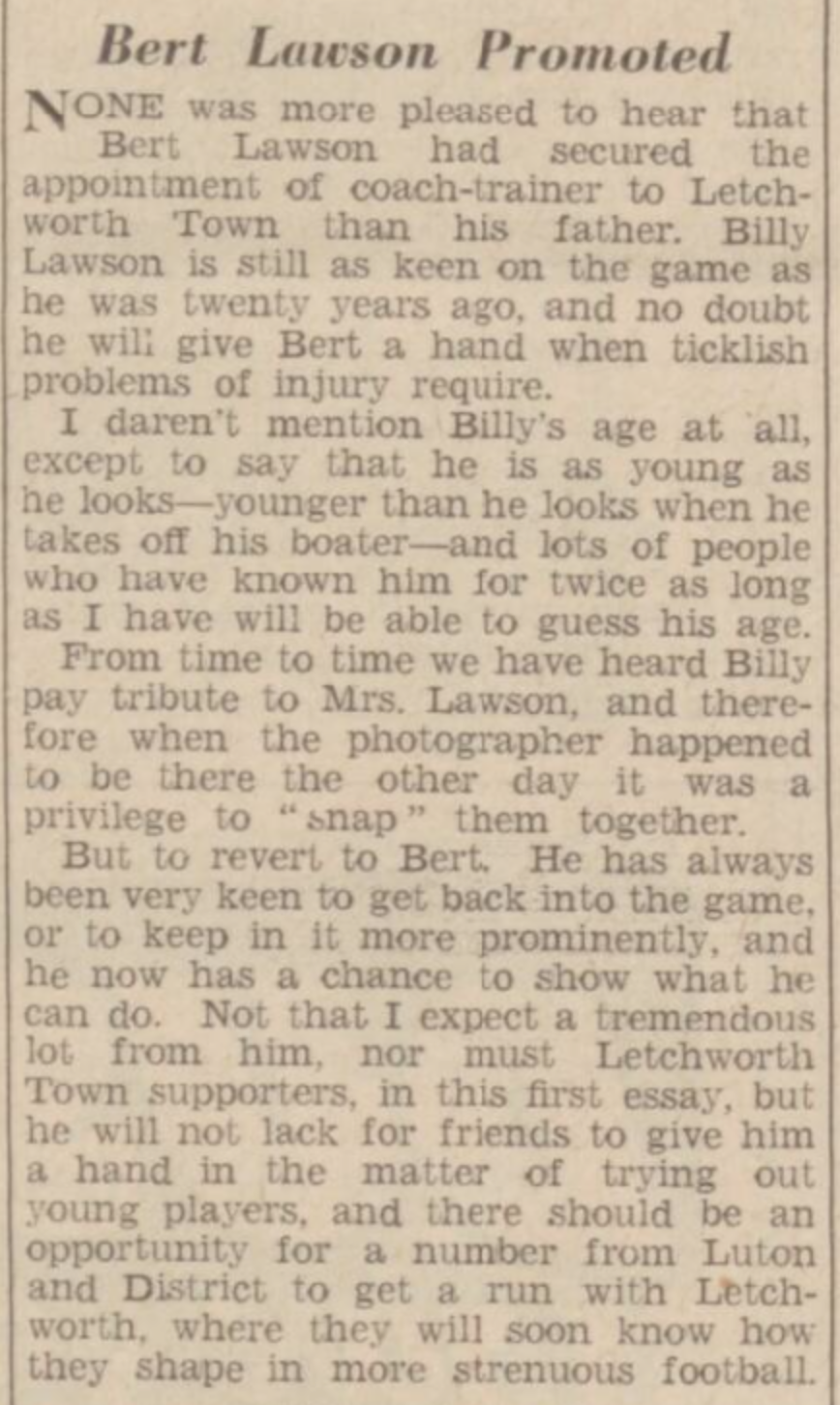
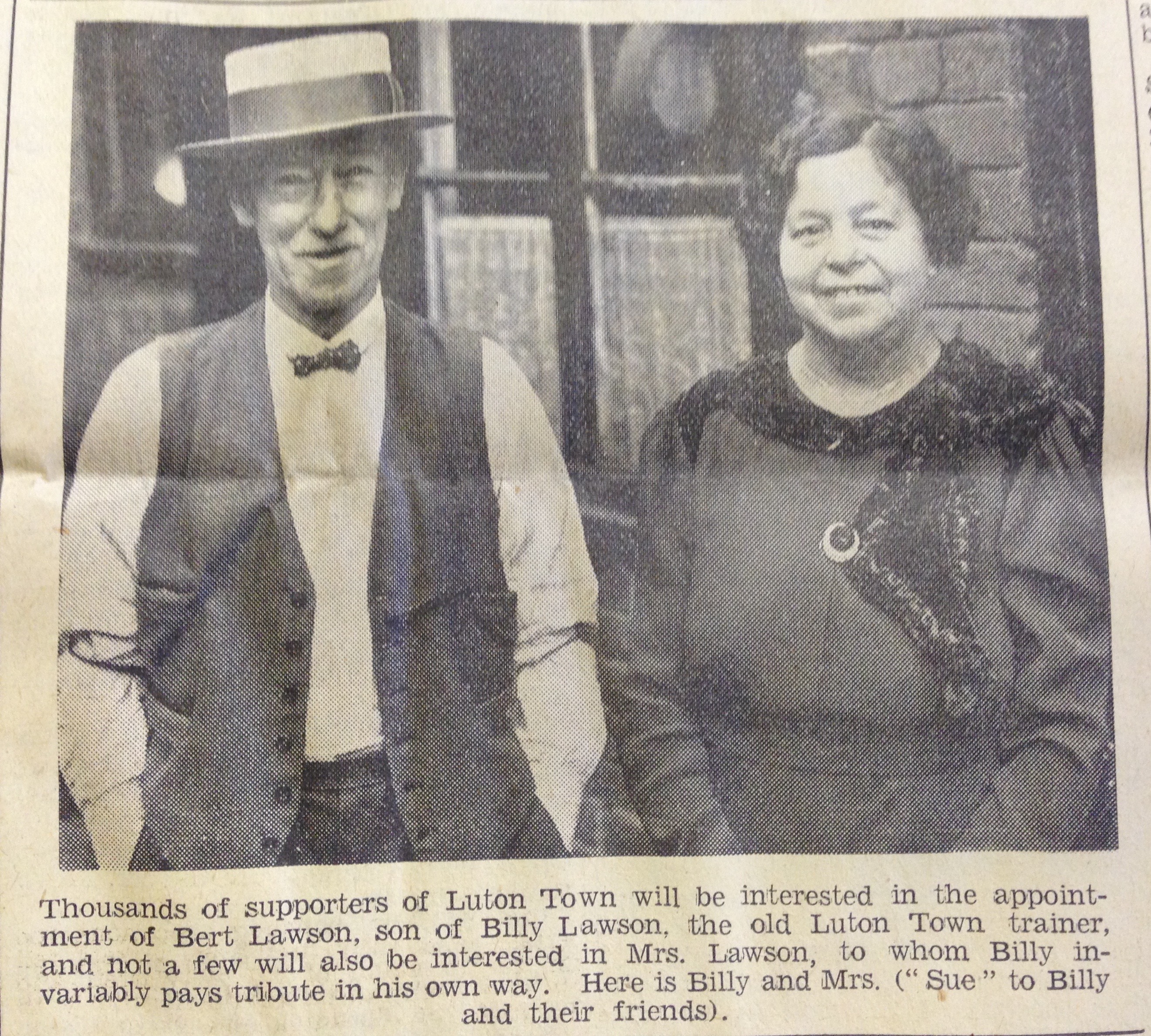
Billy died in Luton in late 1942. A Lutonian who lived, worked and died in the town. Finding God and giving up drink in 1906 probably extended his life as a trainer. A great servant to the club and highly respected in the football world as a trainer. It says everything that Ernie Simms took the trouble to come down from South Shields to play in Billy’s Testimonial match in December 1923. Billy Lawson, a true Luton Town great.
Since this article was published Richard Webb has kindly provided more information on Billy and the family as follows –
William “Billy” Lawson was born in Luton on 12 February 1866 the first child of William Lawson and Elizabeth Glenister. Billy was born several months before his parents were married (they married at St. Mary’s Church Luton on 24 November 1866) and as a consequence his birth was registered as William Lawson Glenister. The Glenister name was also used when Billy married his wife Sue (Susan Shane) in the spring of 1888 and when the births of their children were registered. The marriage was registered in Luton between April and June of that year although I don’t have a specific date.. Like Billy Sue was also from Luton and was born on 8 October 1869. The dates of birth for both Billy and Sue come from the 1939 Register taken at the outbreak of WW2.
Billy was one of ten children born to William and Elizabeth. Aside from two who died in infancy the remainder married and lived in Luton or the surrounding area. The 1871 census shows Billy with the family at 11 High Town Road, Luton and in 1881 just down the street at 25 High Town Road. Billy would spend all his life in Luton. Following his marriage to Sue the couple moved into 33 Windmill Street, Luton (1891 census) and then 25 Brunswick Street, Luton (1901 census onwards) where he spent the rest of his life.
Billy’s mother Elizabeth died at 23 Grafton Street, Luton on 23 November 1904 (Death Notice Luton Times and Advertiser 25 November 1904). His father William survived another 20 years and passed away in the autumn of 1924.
Billy and Sue Lawson had 9 children (one died in infancy) and the rest married and lived in Luton. The surviving children were:
Lily, William (“Sonny”), Rosa May, Charles, Walter, John, Herbert, and Susan Doris.
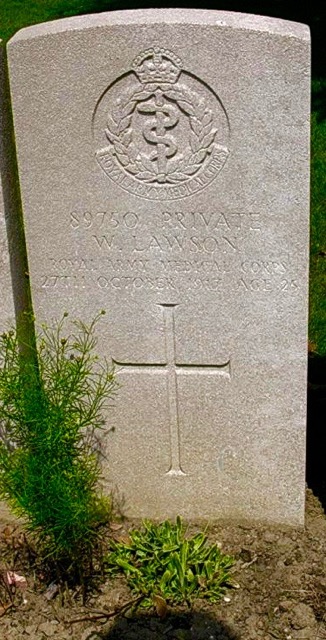 Left is a photo of the gravestone for William (“Sonny”) who died in WW1. He is buried in Lijssenthoek Military Cemetery, Belgium.
Left is a photo of the gravestone for William (“Sonny”) who died in WW1. He is buried in Lijssenthoek Military Cemetery, Belgium.
Thanks to Tracey Cordt for many of the Photos
Richard Webb for much information and the photos of Billy’s medal
Roger Wash
The Luton News
The Pictorial

